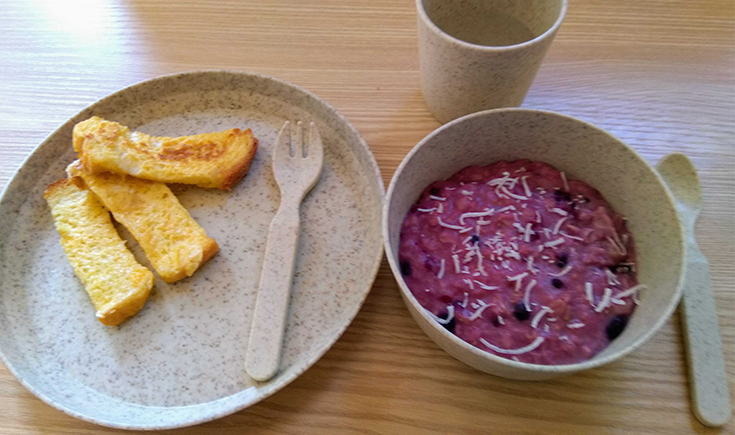

If you’re trying to do what you can to protect the planet, you’ll suddenly notice endless plastic products for babies when you become a parent. You don’t have to compromise on your ideals when you start a family, though. Keep in mind that parenting is already a tough gig, so don’t aim for perfection. Reducing plastic as much as you’re able to to will still have real environmental benefits.
Here is our list of 10 items that most babies need, and some ideas for plastic-free substitutions:
1. Toys
Let friends and family know that you love plastic-free toys and baby gear. With all of your own best intentions, people love to shower new parents with gifts so let them politely know in advance what you’d like. Have a look around at sustainable toys or ask for hand-me-downs.
2. Baby wipes
Instead of buying the disposable wipes that not only contribute to landfill, but are expensive and sometimes harsh on baby skin, you can buy washable wipes. You can find reusable wipes for faces (perfect for when they start solids) or bottoms, and they come with a container to store the clean ones (just add water to them), and one for the dirty ones that just throw into the wash when the container becomes full. There are plenty of tutorials online if you’d like to make wipes yourself instead.
3. Nappies
At least 800 million nappies end up in landfill every year in Australia, and they can take anywhere between 200-500 years to break down. Generally, cloth nappies are better for the planet (and they’re plastic free) than the environmentally-friendly nappies on the market, so long as they’re sustainably produced, dried on the clothesline, and used across multiple babies. Even if you only swap out a couple of nappies a day, it all quickly adds up to a lot less nappies in landfill.
4. Milk bottles and sippy cups
There are some great tough glass baby bottles now, and plenty of stainless steel sippy cups and drink bottles for when they’re older. The bonus about going plastic-free is that there’s no risk of any chemicals leaching into their drinks.
5. Nursing and sanitary pads
This one’s for you. Any kind of pad you can think of can be found in a reusable form. Cloth pads are gentler, contain no chemicals, and are easy to throw in the wash with your cloth wipes and nappies!
6. Bags
Ditch the single-use plastic bags for dirty nappies when you’re out and about. Get yourself some washable wet bags to throw the dirty cloth nappies, wipes, and clothes into until you get home. Don’t forget your fabric shopping bags when you go out with bub!
7. Containers
Once your baby starts solids, you can use glass (keep all your jars!) or stainless steel containers to carry their food with you when you’re out. Remember to pack your reusable coffee cup as well – mums often need coffee on the go!
8. Dummies
If you decide to give your baby a dummy (or they decide for you!), then you’re going to go through a lot of them over time. There are lovely natural rubber options on the market.
9. Tableware
Believe it or not, babies don’t need plastic plates, bowls, cutlery, and cups. They can use whatever you have in the house, so save your money and the planet when you introduce your baby to food, and use ceramic, bamboo, stainless steel, and glass.
10. Care products
If you use any sort of care products for your baby, such as bath oil or bottom balm, have a look around for those that come in eco-friendly packaging. Also, do your research into products you’ll find in your kitchen that are safe enough to use on your baby’s delicate skin.
Going mostly plastic-free in the home when you have a baby can be less convenient and cost more initially, but the long-term benefits of protecting the planet for the future of your growing child is invaluable. Whatever small changes you can make now will make a huge impact. It’s inevitable that some plastic will creep into your life, but don’t beat yourself up about it. Focus instead on what you have done, feel proud of your efforts, and enjoy it all!























